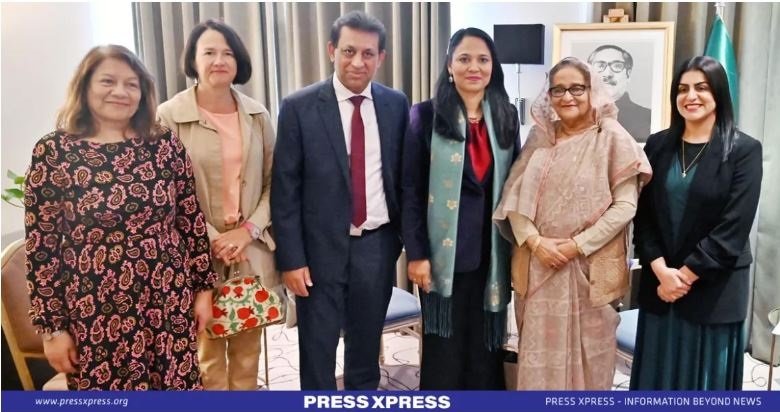…during the 2013 and 2014 BNP-Jamaat alliance movement, a wave of violence swept across the country, characterized by the hurling of petrol bombs at buses, trains, and launches, resulting in the burning of individuals and the destruction of public and private properties
Prime Minister Sheikh Hasina’s unwavering commitment to the preservation of democracy in Bangladesh was reiterated during a meeting with the All-Party Parliamentary Group (APPG) on Bangladesh Affairs. The delegation expressed its satisfaction with the preparations for an upcoming free and fair election in the country.
You can also read: Sheikh Hasina to VOA: Firmly Rejects Return to Caretaker Government System
The meeting was attended by Foreign Minister AK Abdul Momen, Prime Minister’s Office (PMO) Secretary Mohammad Salahuddin, Bangladesh High Commissioner to the UK Saida Muna Tasnim, and Prime Minister’s Speech Writer Md Nazrul Islam. Notable British figures, including Lord Ahmed of Wimbledon and Lord Jitesh Gadhia, paid a courtesy call to Prime Minister Sheikh Hasina.
Democracy at Any Cost
Prime Minister Sheikh Hasina, currently in London, emphasized the critical importance of upholding democracy in Bangladesh during her courtesy meeting with the APPG delegation. She firmly stated that democratic forces must prevail, preventing any undemocratic elements from seizing power.
Sheikh Hasina stated that during the 2013 and 2014 BNP-Jamaat alliance movement, a wave of violence swept across the country, characterized by the hurling of petrol bombs at buses, trains, and launches, resulting in the burning of individuals and the destruction of public and private properties. She went on to emphasize that this rampage had inflicted significant harm on many, including women, who suffered severe burns in these arson attacks, leading to inhumane living conditions.
She also addressed the opposition, saying, “We do not object to your [BNP’s] movement, even though you had previously killed 29 policemen. However, any further attempts to endanger people’s lives will not be tolerated, and no leniency will be shown.”
Meeting Highlights
Prime Minister Sheikh Hasina welcomed the delegation of the All-Party Parliamentary Group (APPG) on Bangladesh Affairs to her residence at Taj Hotel in London. The APPG Chair for Bangladesh and Rohingya Affairs, Rushnara Ali MP, along with the Shadow Minister for Investment and Small Business, led the delegation. Other members of the delegation included notable figures from the Scottish Parliament and the Cross-Party Group on Bangladesh.
After the courtesy meeting, Foreign Minister AK Abdul Momen briefed journalists on the proceedings. Prime Minister Sheikh Hasina reiterated her commitment to holding free and fair elections and discussed measures taken to ensure the integrity of the electoral process.
Key Election Preparations
The Prime Minister highlighted the enactment of a law aimed at establishing a new Election Commission (EC) through a search committee. This move is designed to provide the EC with complete administrative and financial independence, ensuring its ability to conduct elections without interference. Additionally, she mentioned the preparation of a voter list with photographs and the use of transparent ballot boxes, aligning with proposals made by her party during its time in opposition.
International Observers Invited
The APPG delegation expressed its contentment with the preparations for the upcoming election. Foreign Minister Momen extended an invitation to the delegation to send an election observation team to supervise the general elections, a gesture indicative of Bangladesh’s commitment to transparency.
Development and Bilateral Relations
Prime Minister Sheikh Hasina credited the continuous democracy and stable environment in Bangladesh for the country’s remarkable development. She expressed satisfaction with the bilateral relations between Bangladesh and the UK, highlighting various ongoing business endeavors and increasing British investments in Bangladesh.
Investment Opportunities
In pursuit of greater economic collaboration, the Prime Minister sought increased investment from the UK, particularly in the field of renewable energy. She noted the establishment of 100 special economic zones and 39 hi-tech parks in Bangladesh and extended an offer to create dedicated economic zones not only in Bangladesh but also in South Korea, India, and Japan.
Rohingya Issue
Prime Minister Sheikh Hasina sought the UK’s support in repatriating the Rohingya refugees to Myanmar, emphasizing their desire to return to their homeland. Bangladesh has also drawn attention to the declining humanitarian funds for the Rohingya issue, and the British government expressed its commitment to supporting Bangladesh in the International Court of Justice regarding this matter.
Ukraine Conflict
Regarding the ongoing Ukraine conflict, Prime Minister Sheikh Hasina underscored Bangladesh’s preference for peaceful resolutions and negotiations over war. She referred to the suffering experienced during Bangladesh’s independence war in 1971, emphasizing the need to avoid war, especially for the sake of vulnerable populations.
Business and Investments
Prominent business leaders, including Gopichand Hinduja, Prakash P Hinduja, Ashok Hinduja, and Dhiraj Hinduja, met with Prime Minister Sheikh Hasina to discuss potential business opportunities in Bangladesh. Lord Rami Ranger and international human rights lawyer Professor Payam Akhawan also paid separate courtesy calls.
Upcoming Courtesy Call
Cherie Blair, Co-Founder and Chair of OMNIA, is scheduled to pay a courtesy call to Prime Minister Sheikh Hasina in the evening of October 2nd, further indicating the importance of these diplomatic exchanges.
In conclusion, Prime Minister Sheikh Hasina’s dedication to preserving democracy in Bangladesh was evident during her meeting with the All-Party Parliamentary Group (APPG) on Bangladesh Affairs in London. The delegation expressed satisfaction with election preparations and discussed various crucial issues, including bilateral relations, investment opportunities, the Rohingya crisis, and the Ukraine conflict. These diplomatic exchanges underscore the significance of international cooperation in addressing global challenges and promoting peace and prosperity.


